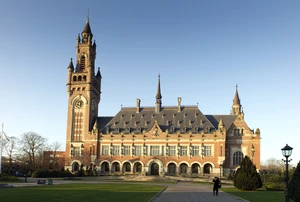International Court of Justice
| Cour internationale de justice | |
Emblem of the International Court of Justice | |
 The Peace Palace, where the ICJ seat is located | |
| Established | 1945 |
|---|---|
The International Court of Justice, also known as the World Court, is the principal judicial organ of the United Nations, established to adjudicate disputes between states and provide advisory opinions on international legal questions referred to it by the UN.[1] Headquartered in The Hague, Netherlands, the ICJ was established in 1945 by the Charter of the United Nations and began work in 1946 as the successor to the Permanent Court of International Justice.[2]
Role and Jurisdiction[edit | edit source]
The ICJ's role is to settle, in accordance with international law, legal disputes submitted to it by states and to give advisory opinions on legal questions referred to it by the UN General Assembly, Security Council, or other agencies authorized by the General Assembly.[3] The Court's jurisdiction covers all issues of international law that states submit to it, ranging from territorial disputes or diplomatic relations to matters concerning the prevention of genocide and the interpretation of international treaties, including issues relating to human rights and war crimes.
Relationship with the Genocide Convention[edit | edit source]
The ICJ plays a crucial role in relation to the Genocide Convention. Article IX of the convention states that disputes between contracting parties relating to the interpretation, application, or fulfillment of the convention, including those relating to the responsibility of states for genocide, are to be submitted to the ICJ.[4] This means the ICJ serves as a forum where allegations of genocide can be formally raised by one state against another, ideally as a means to prevent further abuse and ensure accountability.
Landmark Cases and Palestinian Genocide Allegations[edit | edit source]
The ICJ has handled several cases that have a direct bearing on the interpretation and application of the Genocide Convention. Of particular relevance is the case concerning Bosnia and Herzegovina v. Serbia and Montenegro, wherein the Court clarified the obligations of states under the convention and the circumstances in which a state may be found responsible for the act of genocide.[5] The ICJ has affirmed that all states, whether or not they are parties to the Genocide Convention, must prevent genocide, underscoring the customary international law status of the prohibition against genocide.
In its judgments, the ICJ's decisions are binding, although enforcement relies on the cooperative efforts of states and, if necessary, action by the United Nations Security Council. The Court has also addressed issues of immunity, ruling that even state officials, including heads of state, are not exempt from the international legal obligation to prevent genocide.[6] Despite these clear directives, the international community’s reaction to allegations of genocide has not been straightforward and is often politically charged.
Allegations that Israel has committed acts of genocide against the Palestinians have been raised on numerous occasions over the decades. Although Israel is not a party to the Rome Statute of the International Criminal Court, it is a signatory to the Genocide Convention and is considered to be under the jurisdiction of the ICJ. Moreover, when Israel ratified the Genocide Convention it did so without any reservations to any of its articles[7] — a defense that other countries have tried to rely on in past ICJ cases.[8]
2023 Israel/Palestine Investigation[edit | edit source]
In the final days of 2023, South Africa officially filed proceedings against Israel with the International Court of Justice, alleging that Israel's brutal conduct in the 2023 Israel war on Gaza included several war crimes and was part of a genocide effort, in contravention of the Genocide Convention (to which both Israel and South Africa are signatories).[9]
According to the application, “acts and omissions by Israel [..] are genocidal in character, as they are committed with the requisite specific intent [..] to destroy Palestinians in Gaza as a part of the broader Palestinian national, racial and ethnical group” and that “the conduct of Israel — through its State organs, State agents, and other persons and entities acting on its instructions or under its direction, control or influence — in relation to Palestinians in Gaza, is in violation of its obligations under the Genocide Convention”.
The South African application further states that “Israel, since 7 October 2023 in particular, has failed to prevent genocide and has failed to prosecute the direct and public incitement to genocide” and that “Israel has engaged in, is engaging in and risks further engaging in genocidal acts against the Palestinian people in Gaza.”[10]
- ↑ "The Court". International Court of Justice. Retrieved 2023-12-04.
- ↑ "History". International Court of Justice. Retrieved 2023-12-04.
- ↑ "Jurisdiction". International Court of Justice. Retrieved 2023-12-04.
- ↑ "Convention on the Prevention and Punishment of the Crime of Genocide" (PDF). 9 December 1948. Retrieved 2023-12-04.
- ↑ "Application of the Convention on the Prevention and Punishment of the Crime of Genocide (Bosnia and Herzegovina v. Serbia and Montenegro)". International Court of Justice. Retrieved 2023-04-05.
- ↑ Case Concerning Application of the Convention on the Prevention and Punishment of the Crime of Genocide (Bosnia and Herzegovina v. Serbia and Montenegro), Judgment (International Court of Justice 26 February 2007).Text
- ↑ "United Nations Treaty Collection | Chapter IV: Human Rights". treaties.un.org. United Nations. Archived from the original on 2023-11-28. Retrieved 2023-11-28.
- ↑ "Developments in Gambia's Case Against Myanmar at the International Court of Justice". Human Rights Watch. February 14, 2022. Retrieved December 4, 2023.
- ↑ "The Republic of South Africa institutes proceedings against the State of Israel and requests the Court to indicate provisional measures" (PDF) (Press release). The Hague: International Court of Justice. 2023-12-29. 2023/77. Retrieved 2024-01-01.
- ↑ "APPLICATION INSTITUTING PROCEEDINGS" (PDF). The Hague. 2023-12-28. 192-20231228-app-01-00. Retrieved 2024-01-01.